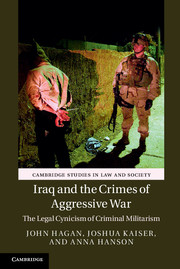Prologue
Published online by Cambridge University Press: 05 July 2015
Summary
The first assault in the U.S.-led Iraq War was spearheaded by two F-117 Nighthawks dropping four 2,000-pound Bunker Buster bombs and four ships firing forty Tomahawk cruise missiles. They targeted a compound outside Baghdad where U.S. intelligence mistakenly believed Saddam Hussein was visiting his sons. Saddam apparently had not been there in almost twenty years. This assault killed the war's first civilian bystander.
The first strike was followed two days later by the Shock and Awe launch of 1,700 air sorties with hundreds more cruise missiles. Arab-American journalist Anthony Shadid reported from the ground that “Baghdad's residents … were terrified. In the three hour blitz, at times bringing a new blast every ten seconds, Saddam's garrisons and the symbols of his three-decade rule were shattered” (Shadid 2005 :61). The British Guardian newspaper called Shock and Awe terrorism by another name (Whitaker 2003). Iraq Body Count estimated that more than 6,000 civilians were killed in the ensuing first phase of the U.S.-led invasion.
A 1974 UN General Assembly resolution defines a war of aggression as the “serious and dangerous” use of force by one nation against another. However, this definition is too inclusive. We argue in the first chapter of this book that the genocide in Sudan's Darfur region was one among numerous instances where another state justifiably could and should have used force to stop the killing of civilians. There are also circumstances in which one state is justified in defending another state against attack, for example, when Germany invaded an undefended Poland to begin World War II. The 1974 UN definition is too broad for purposes of criminal prosecutions or social scientific research, and there is no cumulative case law to clarify the definition of aggressive war.
The unformed nature of today's law of aggressive war is similar in some ways to the laws about unethical business practices encountered in the 1950s by Edwin Sutherland, the famous American criminologist who coined the term “white collar crime” that today still frames much discourse about financial illegality.
- Type
- Chapter
- Information
- Iraq and the Crimes of Aggressive WarThe Legal Cynicism of Criminal Militarism, pp. 1 - 16Publisher: Cambridge University PressPrint publication year: 2015



